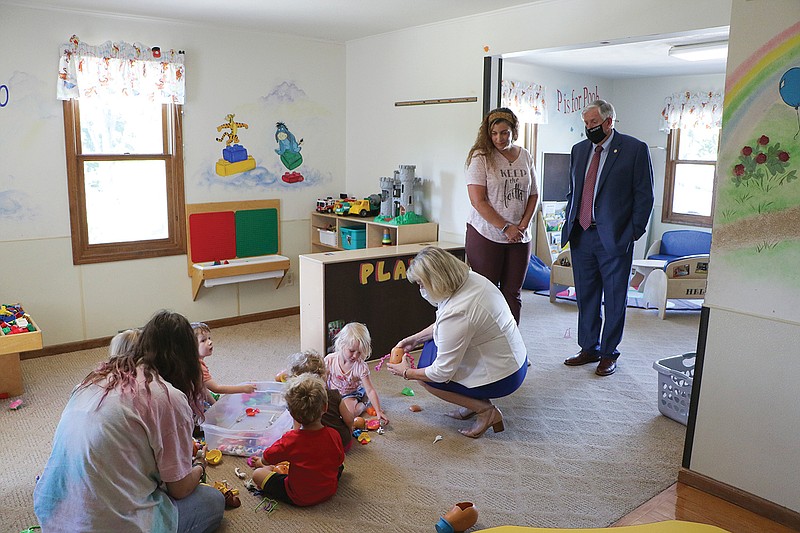Gov. Mike Parson proposed in his budget for the next fiscal year to invest more than $722 million in child care.
The effort, state administrators said, will strengthen Missouri's child care network by helping providers maintain or resume operations, develop the child care workforce and increase the quality of care.
Revenue for the efforts is to come from the American Rescue Plan Act (President Joe Biden's $1.9 trillion stimulus package) and other COVID-19 pandemic recovery funding, said Mallory McGowin, the Missouri Department of Elementary and Secondary Education (DESE) chief communications officer.
"Compared to pre-pandemic data, there's been a 30 percent reduction in child care facilities and children receiving subsidized care, and over 60 percent of the state is currently considered a child care desert," McGowin said in a news release. "Missouri must grow the child care industry by strengthening the workforce and improving access for families.
"Families need access to quality care and education to return to work or school, yet child care programs continue to face challenges with operations and staffing. These funds will help reimburse their business operations, provide incentives to recruit and retain child care staff, and support professional development activities," she said.
DESE understands access to the one-time funding source ends in 2024, so it is being strategic in selecting where to invest. The department does not want child care providers to reach the end of the funding cycle and still be dependent on the funding, McGowin said.
About $280 million (of the $722 million proposed) is considered discretionary ARPA funds. Discretionary funds are to be included in the second supplemental spending package, she said.
The first supplemental package, which Parson signed Thursday, funds the state worker pay raise, covers requirements for Medicaid expansion and allocates federal funds to school districts -- all emergency actions that needed to meet deadlines.
The second supplemental package will include budget requests from departments to fund any unfunded needs through June.
Among the proposed discretionary funds is $49.6 million for retention of child care staff. This block of revenue would provide funds so child care providers can give incentives to staff members who have recently entered the industry (within the previous six months) and those who have remained in it longer than six months, to support retention.
It is limited to child care staff members who have had continuous employment with child care providers enrolled in the state subsidy program in order to promote recruitment and retention. The provider must attest they will give the incentive to their child care staff. Staff members are to receive $500 for less than six months of continuous employment and $1,000 for six to 12 months of continuous employment. Staff members who have been with the same provider for 12-18 months are to receive $2,000; and those who have been on the job for more than 18 months receive $3,000.
Other revenue ($17 million) is being offered to help providers meet payroll obligations.
Thirty million dollars is to be provided as incentives for programs to add 1,500 slots for infants and toddlers, 500 slots for children with special needs and 1,500 slots for all children during non-traditional hours. Those funds are to be targeted toward areas with child care deserts.
The discretionary funds would include $60 million for innovation grants, which are intended to increase the availability of quality child care within communities. This includes opportunities for grants for businesses or hospitals that start new, or expand existing, on-site or nearby child care programs. The grants would require matches from the hospital or business involved.
Another $18.6 million would create a Missouri Infant Early Childhood Mental Health (IECMH) system. The initiative would include coaching, reflective supervision, professional development, and onsite consultation in early learning programs to support families and children with challenging behaviors and social emotional needs.
Missouri would partner with professional development, Mental Health Community Centers, nurse health consultants and others for IECMH teams.
Other grants would allow higher education locations to expand or offer on-site child care.
Yet more grants would support child care facilities' expansion or help start new programs.
About $444 million coming from ARPA is intended to stabilize child care throughout the state. It would be included in next year's budget.
The Stabilization Care Spend Plan includes $138.5 million for a paycheck protection program to help child care providers with payroll costs -- including benefits, mortgage interest, rent, utilities, worker protections costs related to COVID-19, and expenses for operations. The program is limited to child care providers enrolled in the state subsidy program. Providers must attest they did not receive any other COVID-19-related funding for these costs, will pay the same amount or greater, in wages and benefits for the duration of the grant, and will provide families enrolled in their program with relief from co- payments and tuition payments, to the extent possible.
It includes $183.75 million to retain child care staff.
Like the discretionary funds, it provides payments for staff that is based on how long they have been with a child care provider.
The governor's proposal provides $67.5 million to sustain operations for licensed and subsidy contracted programs. Eligible providers will receive an additional monthly payment of $100 per child in the subsidy program and $200 in the subsidy-and-licensed program for each child during a given month.
The proposal includes $10 million to offset costs of annual training for child care staff members (including health and safety training, first aid and other requirements).

